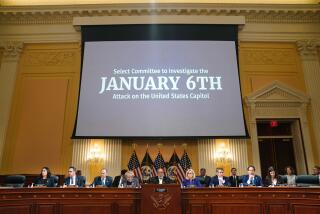Panel Chides Justice Dept. on S&L; Fraud Prosecutions : Thrifts scandal: The House subcommittee says funding, manpower and subpoena needs have not been adequately pressed with Congress.
- Share via
WASHINGTON — The Justice Department has not given the investigation and prosecution of fraud in the multibillion-dollar savings and loan scandal the priority the public demands, a House panel concluded in a report released Sunday.
The Government Operations subcommittee on commerce, consumer and monetary affairs said the department repeatedly has misled Congress over the past two years about funding needed to catch and jail savings and loan crooks.
In addition, the report said, the department has failed to address issues that have hampered investigation and prosecution of savings and loan fraud, such as the FBI’s lack of document subpoena authority and inadequate pay for FBI agents and for prosecutors.
“The Justice Department’s rhetoric concerning its priorities has not matched its willingness to address a number of issues . . . which continue to adversely affect the U.S. government’s ability to apply the criminal justice system to culpable individuals,” Rep. Doug Barnard Jr. (D-Ga.), chairman of the subcommittee, said in a statement.
“I have great difficulty in accepting that a person who commits substantial fraud against an S&L; or bank may completely escape investigation and prosecution if that person committed the offense in most areas of the United States that did not receive enough additional resources,” he said.
Doug Tillett, a spokesman for the Justice Department, said he could not comment on the report until the department has a chance to review it.
But he noted that in the past 13 months, 519 individuals have been charged in major savings and loan fraud cases--those involving losses of $100,000 or more--and 355 have been convicted.
Congress authorized $75 million in the 1989 savings and loan bailout legislation to beef up prosecution of individuals who looted thrift institutions, but the Administration sought and Congress appropriated only $50 million for fiscal 1990.
In its fiscal 1991 budget, the Administration initially sought to increase that allocation only by $1.8 million. But after complaints from Congress, President Bush announced last June he wanted to double the $50 million in fiscal 1991.
Congress ultimately appropriated $176 million to the Justice Department and the Internal Revenue Service for S&L; fraud investigation and prosecution during the fiscal year that began Oct. 1.
But even with the extra money, according to Barnard’s subcommittee, the FBI still is $8 million short of what it needs to hire the agents and support staff its division offices requested in 1989 for S&L; fraud enforcement, and $26 million short of what it needs to deal with a backlog of more than 21,000 inactive S&L; cases.
“These past failures to ask for sufficient funds have resulted in more delays, more stale cases and many cases which may not be brought because of statute of limitations problems or fading memories,” the report said.
The House subcommittee recommended that federal bank regulatory agencies make 140 to 180 examiners and attorneys available within the next four months to help the FBI and federal prosecutors eliminate the backlog of financial fraud cases.
The panel also recommended that Congress upgrade the pay of federal law enforcement agents and prosecutors to reduce the rapid personnel turnover that is “seriously delaying and negatively impacting” investigation and prosecution of financial fraud, especially in New York and California.
In another area, the subcommittee said Congress should grant the FBI the authority to subpoena documents related to savings and loan fraud. Currently, federal prosecutors must impanel a grand jury to issue a subpoena during an ongoing investigation each time the FBI requires documents.
While the FBI already has document subpoena authority in drug cases and has been seeking similar authority in S&L; fraud cases since 1988, the report said opposition from key federal prosecutors apparently has kept the Justice Department from seeking the appropriate legislation.
More to Read
Get the L.A. Times Politics newsletter
Deeply reported insights into legislation, politics and policy from Sacramento, Washington and beyond. In your inbox twice per week.
You may occasionally receive promotional content from the Los Angeles Times.









